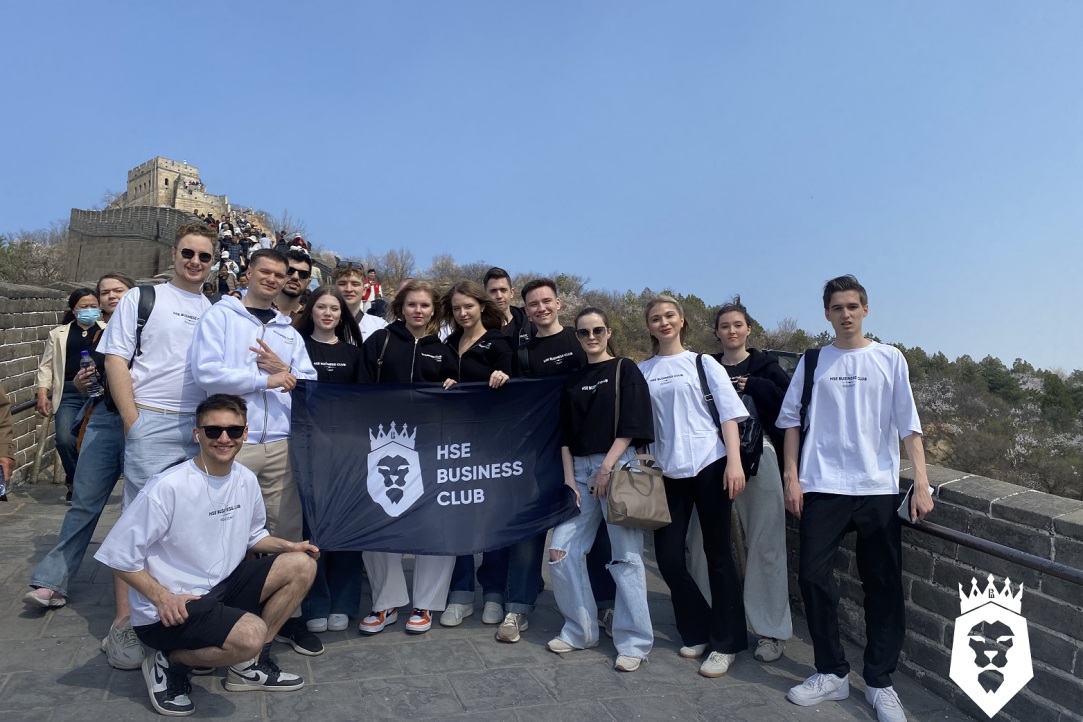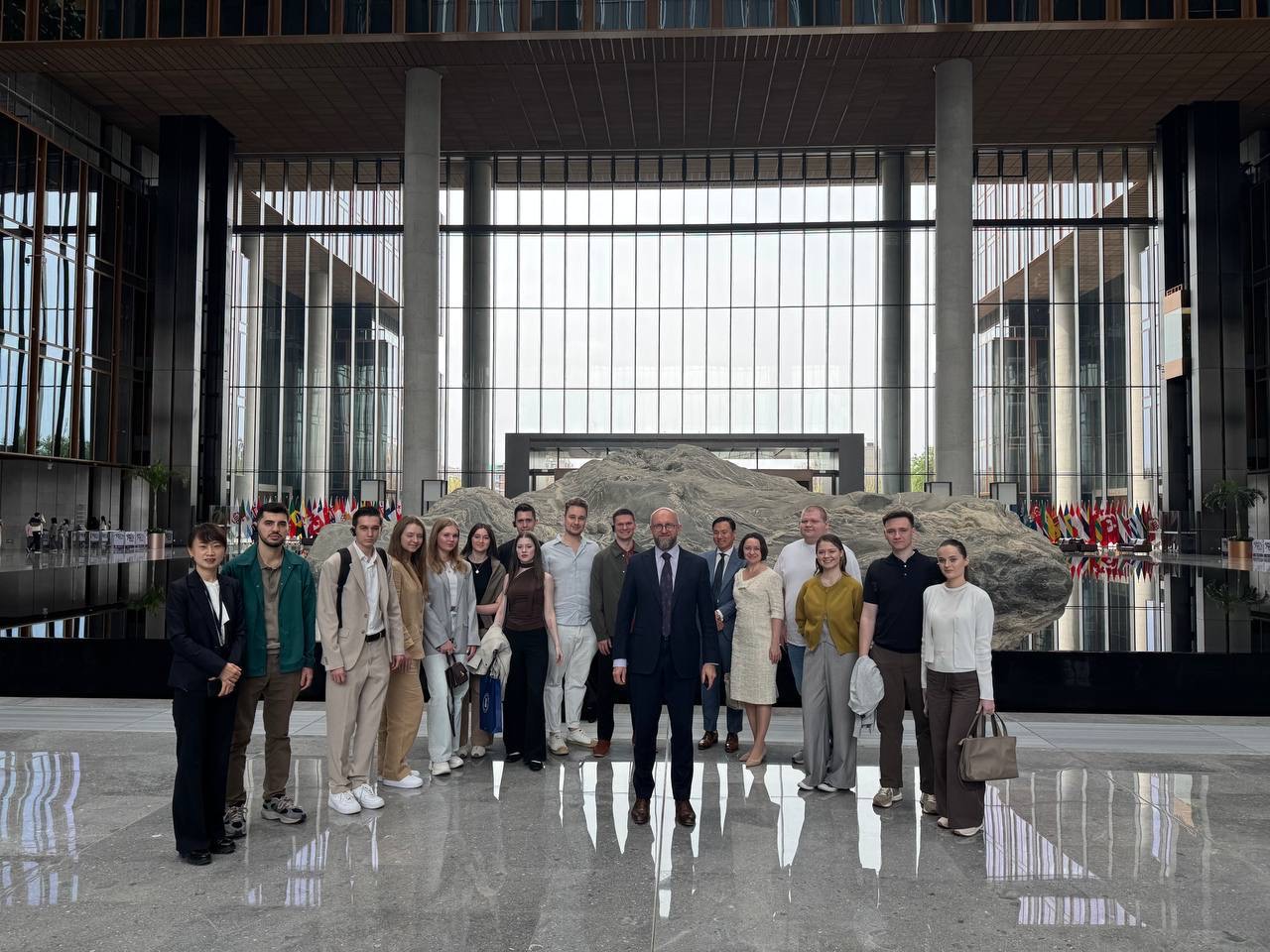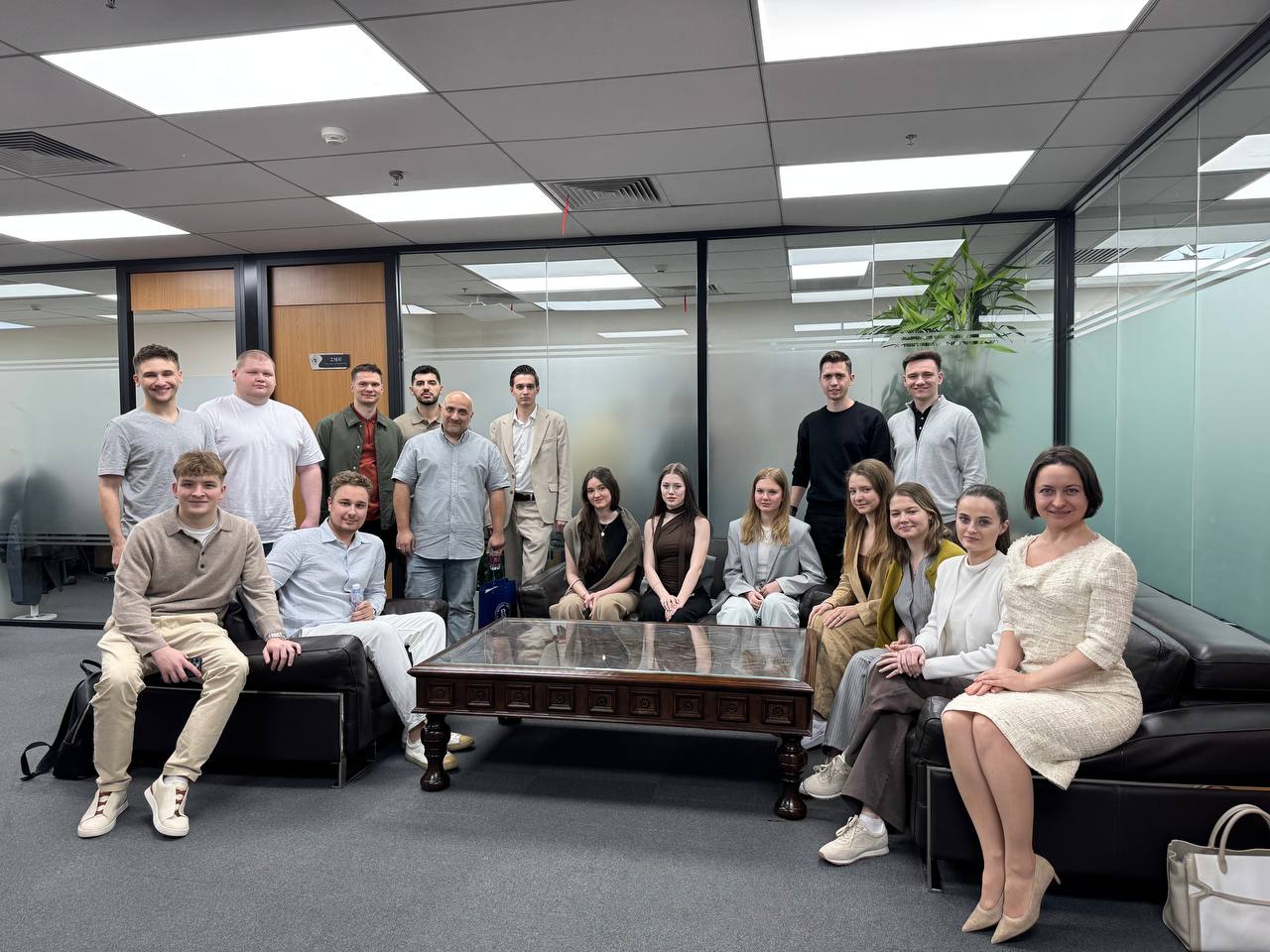HSE Business Club in China: Student Entrepreneurs Travel to the Economic Hub of Asia

HSE Business Club organised a unique trip to China for the Russian student entrepreneurial community. As part of their business mission, participants held a series of meetings with representatives from leading universities, entrepreneurs, and top managers of both national and international companies. They explored the specific features of the Chinese business landscape and gained valuable insights into the workings of one of the world's key economic centres.
More than 15 students and alumni of HSE University, including residents of the closed section of HSE Business Club and members of its core team, took part in the trip. The delegation also included Professor Margarita Zobnina, representing the HSE Entrepreneurship Laboratory. The trip was supported by Dmitry Shminke, head of the laboratory and HSE Deputy Vice Rector.
The itinerary was intense: the students visited China’s three largest cities—Beijing, Shanghai, and Hong Kong—travelling from the north to the south of the country.
Meeting at the Asian Infrastructure Investment Bank
The first stop was the capital of the People's Republic of China. In Beijing, the delegation visited the Asian Infrastructure Investment Bank (AIIB), the second-largest international development finance institution, comprising over 110 member countries. At the bank’s headquarters, the students met with AIIB Vice President and Chief Investment Officer Konstantin Limitovskiy. They discussed the bank’s operations, its role in global infrastructure financing, and trends in sustainable development in Asia. ‘I was pleased to welcome the student delegation from HSE Business Club to AIIB headquarters and firmly believe that these exchanges help to strengthen ties between young people and the global community,’ said Konstantin Limitovskiy. ‘It was a pleasure to hear their thoughts on infrastructure investment by multilateral development banks such as AIIB and answer their questions. I was also impressed by their curiosity, openness, and potential as future leaders. I hope they were equally inspired by the visit and returned home with a deeper understanding of how MDBs operate. This trip will undoubtedly contribute meaningfully to their future development.’

Also present at the meeting were AIIB’s Chief Economist, Eric Berglof, and Principal Investment Officer Stefen Shin. They gave an in-depth overview of the bank’s investment operations and answered the students’ questions.
Visit to Rusal’s Beijing Office
Later that day, the delegation visited the Beijing office of Rusal, Russia’s leading aluminium producer. Konstantin Altunyan, Head of the company’s operations in China, spoke about the experience of entering the Chinese market, the specifics of negotiation processes, the business culture of the country, and daily life there. ‘I was delighted to meet the HSE students. They were engaged, open-minded, and thoughtful,’ said Konstantin Altunyan. ‘The fact that the participants came not merely as tourists but to learn about the country from the inside and ask direct questions speaks to the maturity of this international initiative. Such trips are more than just an experience—they are steps towards building genuine dialogue between Russia and China. They are bridges constructed by people, not just institutions. I am confident this community has many strong projects ahead, and I hope that China will become not only a destination but a true partner in their development.’

Tsinghua University and the Start-up Ecosystem
An important part of the programme was exploring China’s technological entrepreneurship ecosystem. The delegation visited Tsinghua University—one of the country’s top institutions (ranked 33rd in the QS World University Rankings) —renowned for its innovations and strong entrepreneurial environment. The participants met with members of the Tsinghua Student Entrepreneurship Association to discuss the differences between start-up development approaches in Russia and China.
During their visit, students also toured the Tsinghua X-lab business incubator, which specialises in projects in artificial intelligence, biotechnology, and sustainable energy. Since being founded in 2013, X-lab has supported more than 2,600 teams, with over 900 evolving into full-fledged start-ups. A total of 260 alumni have attracted around 18 billion yuan (approximately 2.5 billion US dollars) in investment.
‘In many parts of the world, business develops step by step—but in China, it sprints forward. It must be ready for intense competition and rapid change, which is why Chinese companies and the government have developed an ‘antifragile’ business model. This model does not just adapt to change—it thrives on chaos and drives innovation,’ noted Polina Negrobova, a member of the organising team of the HSE Business Club’s trip to China.
The delegation also visited TusPark, a science park established with the support of Tsinghua University. There, participants engaged with innovative companies in robotics and big data analysis, and discussed investment attraction and the interplay between science, education, and business.
‘The scale of support for student start-ups and the general culture of commercialisation at Tsinghua is truly impressive. They have everything in place—from idea to market entry. We have much to learn from them in terms of effectively commercialising the projects of young researchers and entrepreneurs,’ said Margarita Zobnina.
The day concluded with a visit to Dongsheng Science Park, a partner research and innovation cluster of the university.
Centres of Gravity: Shanghai and Hong Kong
The second major stop on the business programme was Shanghai—China’s largest financial and commercial hub. The first meeting took place at New York University Shanghai (ranked 44th in the QS World Rankings), in collaboration with the local Undergraduate Business Association. Participants attended a series of lectures delivered by industry experts:
James Pearson, CEO & Executive Creative Director, Lionheart Global;
Haifang (Susan) Lu, Product Marketing Manager, Lancôme at L'Oréal;
Ruddy Swinnen, Founding Partner, Wise Wings.
The sessions covered topics such as innovation in entrepreneurship, international marketing, and the psychology of career development.
‘It was especially valuable hearing how Western entrepreneurs adapt their business models to the Chinese market,’ remarked Margarita Lazarenko, a resident of HSE Business Club.
The second meeting in Shanghai was with Nikolay Semakov, Head of the China office of Familia, a major off-price fashion retail chain with over 470 stores across Russia. Nikolay shared key insights on business collaboration between Russia and China. The conversation also focused on crucial elements of the Chinese business mindset: the importance of personal relationships (guanxi), cultural negotiation traits, and common mistakes made by foreigners. He shared practical examples from his own mediation experience—how to structure deals effectively, build trust, and avoid misunderstandings. One of the main takeaways was the cultural difference in contract negotiation: ‘In China, relationships come first; documents come later,’ he noted. This meeting offered something textbooks cannot provide—real-life experience and advice that can be practically applied when working with Chinese partners.
‘China today is one of the world’s leading technology hubs. This is where trends are born. Trends that within just a few years, become the global standard—from e-commerce and fintech to industrial AI and energy. For any entrepreneur, especially in the tech sector, it is crucial to keep a close eye on what is happening in China: what solutions are being tested, which start-ups are entering the market, and how value chains are being built. China has surged ahead in many areas, and our goal is not only to observe, but to build bridges, engage in technology transfer, adopt best practices, and adapt them to the Russian market,’ emphasised Dmitry Palchikov, Vice President of HSE Business Club.
Innovations in Digital Technologies and Platforms
In the following days, participants visited two innovative companies—the start-up DH Force and the investment firm LUN Partners. DH Force presented its revolutionary mobile electric vehicle charging system MPS, powered by intelligent robots. The technology enables fully automated charging solutions that can be adapted to any type of vehicle. The start-up’s founders demonstrated working prototypes of their mobile charging robots. Notably, even at the pre-sale stage, the company secured an investment from Sequoia Capital and is now actively expanding into international markets.
LUN Partners, an international investment group with offices in Hong Kong, Shanghai, and Tokyo, specialises in fintech and digital technologies. The team manages a global portfolio of over 50 companies, including more than 10 unicorns, and supports them in expanding into Asian markets. During the meeting, the HSE Business Club delegates spoke with company founder and chairman Li Peilung about investment trends for 2024–2025, success factors for venture-backed start-ups, and how to attract Asian capital. The firm’s investment directors were also present and offered case study analyses.
‘China is a unique market where you need to know how to do business. Throughout our time here, we have observed that every successful business targeting the Chinese market was founded by a Chinese person. The market may be vast, but without an understanding of the culture, it can be difficult to operate effectively,’ noted Viktor Lvov, the first President of HSE Business Club.
Next, members of HSE Business Club visited the Shanghai office of Poizon—one of China’s fastest-growing platforms, currently valued at $10 billion. The company specialises in the sale of limited-edition sneakers, streetwear, and other collectible items. At the meeting, delegates spoke with the Director of Market Expansion, the Regional Director for Russia and Central Asia, and the Marketing Director. Poizon’s business model combines a marketplace with expert authentication, ensuring each product is verified through a five-step process. This has made the platform a must-have for young Chinese consumers, with 80% of users being under the age of 30.
The final trip destination was Hong Kong, where the delegation visited The University of Hong Kong (HKU)—Asia’s leading university (ranked 17th in the QS World Rankings). There, they met with members of the HKU Business Association, the oldest and largest student business community on the peninsula.
A Taste of Chinese Culture
In addition to the business programme, participants were immersed in China’s rich cultural heritage. In Beijing, they visited the Great Wall of China and the Summer Palace, gaining insight into the traditions of ancient imperial dynasties. In Shanghai, participants enjoyed views from the iconic Bund waterfront. In Hangzhou, they explored the famous Longjing tea plantations and took part in a traditional tea ceremony, learning about how premium tea is grown. In Suzhou, visitors explored classic Chinese gardens and ancient canals. Finally, in Hong Kong, they ascended Victoria Peak for panoramic views of the modern metropolis. These cultural experiences provided deeper insight into Chinese values and mindset, an invaluable asset for future business dealings.
The trip to China marked a significant milestone in the HSE Business Club’s series of business missions. For instance, in 2021, the Club organised a trip to Vladivostok to attend the Eastern Economic Forum and meet with Dmitry Alekseev, the founder of DNS. In 2022, a delegation visited Krasnodar Krai, where they toured the Abrau-Durso winery and the Novostal-M metallurgy group. During these trips, as is now, participants witnessed first-hand that direct communication with both international and Russian partners, along with deep immersion into local business environments, is the most efficient way to establish global connections.
HSE Business Club is now actively preparing for its next major event—the fifth annual HSE Business Club Forum 2025. It will be the largest of its kind in Russia, timed to coincide with Russian Entrepreneurship Day. The Forum will be held on 31 May, 2025, at the HSE Cultural Centre and will once again serve as a flagship platform for dialogue between successful Russian entrepreneurs, major businesses, and students.
For more information and to register for the forum, please visit the official website here (in Russian).

